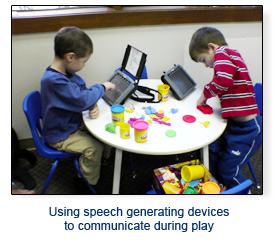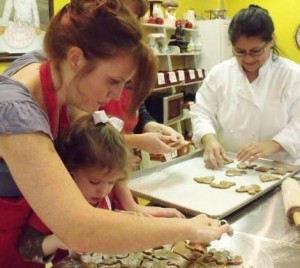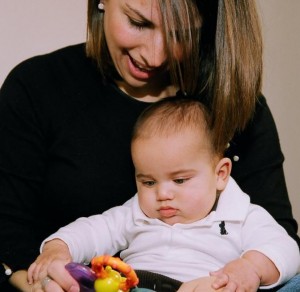Speech disorders can range from problems with articulation to problems speaking any words at all, such as selective mutism. Children who cannot speak at all or those who speak very little have difficulty expressing their basic needs and wants. This can become frustrating for them, which may sometimes result in behavioral issues. One solution is providing your child with an alternative means of communication.
Encouraging Communication in the Home
Speech Therapy TechniquesWhile your child learns new communication skills with his speech-language pathologist (SLP), you can also work on your own communication skills. Learning more effective means of communicating with your speech disordered or delayed child can help him progress more quickly. Take advantage of everyday activities to encourage language. Create a communication-friendly environment for your child by using techniques that stimulate verbal and nonverbal communication. Always discuss home-based speech therapy with your child’s SLP. The SLP can offer advice and suggest educational activities that are tailored to your child’s needs.
Vocal Cord Paralysis
Speech DisordersWhat Is It?
Vocal cord paralysis is a condition in which a person has difficulty speaking because one or both of his vocal cords cannot move. The vocal cords normally vibrate in order to produce voice. This condition can occur in a child or an adult. The most common type is unilateral vocal cord paralysis, in which only one vocal cord has either limited movement or no movement at all. If both vocal cords are immobile, it is called bilateral vocal cord paralysis. This condition will likely require a tracheotomy.
How to Teach the “P” Sound
Speech Therapy TechniquesYour child’s speech-language pathologist (SLP) should provide you with activities to do at home to encourage your child’s progress. If not, ask the SLP for “homework.” If your child needs help with individual sounds, work on helping him master those sounds before moving on to syllables and whole words.
Navigating the Early Intervention Process
Legal IssuesThe Individuals with Disabilities Education Act (IDEA) provides for free speech therapy within the public school system to all children who have a qualifying disability. But what if your child isn’t even in school yet? If you have a child under the age of three and you suspect that he might have a speech disorder, you can have him evaluated and treated with the Early Intervention program.





